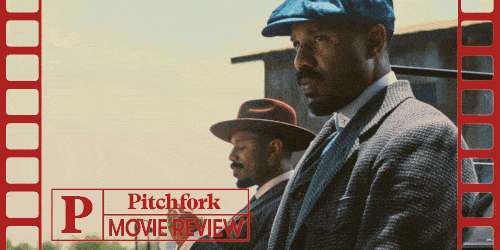Here is the list of topics you expect from Rod Wave: heartbreak, trust issues, loneliness, getting really rich is not all that it’s cracked up to be. Here is the list of topics you don’t expect from Rod Wave: slavery. Last weekend, at the theater to catch Sinners, Ryan Coogler’s new Jim Crow–era vampire thriller starring Michael B. Jordan as cool-ass twins with names (Smoke and Stack) that sound like they’re an underground Bay Area rap duo in 1996, the final credits rolled to the strangest needle drop possible: a crestfallen Rod Wave ballad that includes a brief conversation with an imaginary slave master.
That’s right. As the theater lights flicker back to life, you’re swept up by the Florida crooner’s gently bruised melodies, confessional lyrics that touch on everything from vampire-induced insomnia to “whips and chains,” and the same sort of melancholic instrumental that he has been wailing over forever—you know the one, all washed out and weepy like it should soundtrack a YouTube compilation of tear-jerker scenes from Dawson’s Creek. “Excuse me, master, I think you’re confused/I was promised 40 acres and mules,” he sings, like he’s been punched in the gut. Every now and then in the music video, released a few weeks ago, cotton field scenes from the film blink on the screen. If you experience “Sinners” (the song) removed from the context of Sinners (the movie), you would think it was the theme for 12 Years a Slave, not Coogler’s contemplative vampire romp with spit-swapping sex scenes, characters getting their faces torn off, Delroy Lindo shitting himself, and MBJ dropping more playful “niggas” than a Bossman Dlowmixtape.
In defense of Coogler’s choice to pick Rod Wave for the theme, there are heavy messages attached to Sinners. The movie suggests that the Black American tradition can be carried on through the blues, and it reckons with the ideas of Black ownership and freedom, and the lengths white supremacy then and now has gone to suppress that. It works, in a way, to have Wave, a modern hip-hop bluesman, leave viewers with a bittersweet aftertaste, and they even kind of pull it off. When Wave sang, I leaned back in my recliner and sat with the music for a few minutes as the cleaning crew made its way through the aisles. Sure, we’re a long ways away from 2019’s Ghetto Gospel when Wave’s vocals were heavyhearted and his wounded storytelling was told with the urgency of a man who had been waiting his whole life for a chance to open up, when the music was about a personal struggle buoyed by a sense of hope, but he still has a way of making you take the most ridiculous melodrama seriously.
Nevertheless, “Sinners” is just comically bad, too flat and routine, but the title song may be the least of Sinners’ musical issues. Composer Ludwig Göransson’s Delta blues score is hokey, with the soul of spending a day at a living history reenactment. That plays out in the visually surreal musical sequence halfway through the movie, where, at Smoke and Stack’s juke joint, the blues is traced to gospel, funk, twerk music, West Coast gangsta rap, HBCU marching bands, and even Kanye West’s opulence. It’s an imaginative concept with its heart in the right place, but the stiff and generic genre-skipping of Göransson’s instrumental has the same classroom lecture feel of watching Childish Gambino’s “This Is America” video. (Maybe it’s no surprise that Göransson co-wrote and co-produced that song.)
In contrast to the score and in-film music, Rod Wave’s track is at least not boring or preachy. Actually, it’s even fun to think about how it calls back to the rapper-movie crossover themes that were commonplace in the 1990s, where part of the job was threading together storytelling beats from the movie into the lyrical narrative. Think, Snoop and Dre capturing noir vibes for their theme for Bill Duke’s Deep Cover. Or LL Cool J’s theme for the shark-scientist showdown Deep Blue Sea called “Deepest Bluest,” where he, at one point, raps from the perspective of a shark: “My world’s deep blue/Killers gotta eat, too/Looking for human flesh to rip my teeth through.” (Cool James snapped.) If Sinners were made back then, we might have even gotten a Rod Wave acting turn with a catchphrase, maybe a cool outfit with a cowboy hat or duster coat, and a fun death-by-vampire-bite scene, instead of just a deeply bizarre and serious slow-burn with slavery fiction.
But I wouldn’t change much about “Sinners.” In a worse timeline, Coogler made the call to more obvious and safe pillars of the Southern hip-hop class, like commercially appealing newcomer BigXthaPlug or underground-favorite-turned-bag-getter Killer Mike, and I would have heard the song once and never thought about it again. Rod Wave makes it feel like a throwback to a kind of rap stardom where famous rappers just did shit in pop culture because they were famous rappers. If I ever rewatch Sinners, I’ll be waiting for the final credits just to get a kick out of it all over again.












